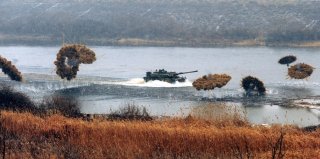South Korea's K2 Black Panther Tank Is Ready For War But it Doesn't Come Cheap
Though expensive, the K2 Black Panther is technologically sophisticated and unique. Its suspension and water crossing ability is optimal for Korea’s hilly and swampy conditions — and combined with top-attack munitions, the K2 would be a hard nut to crack.
Here's What You Need To Remember: The K2 has an incredible water-fording capability designed to handle some of the Korean Peninsula’s wet and swampy terrain.
According to the Guinness World Records organization, the indigenously-developed K2 Black Panther tank is the most expensive tank in the world at $8.5 million dollars. This is for a good reason though: the K2 has a number of features that make it incredibly capable--and quite deadly on the battlefield.
On-road/Off-road/Underwater:
One of the most impressive aspects of the K2 is its suspension system, which can be contorted into a variety of positions. For cross-country performance, the suspension is raised, giving the K2 greater ground clearance. On roads, the suspension is lowered, hugging the ground for better speed.
Additionally, the K2 can lean forward and backward. This gives the tank’s main gun better maneuverability in hull-down positions. When leaning backward, the K2 can raise its main gun to target low-flying aircraft, or to better target more highly elevated targets on Korean Pennisula's hilly terrain. The K2 also has the ability to lean to the left or the right, which improves driving along slopes.
The K2’s engine is a fairly standard 1,500 horsepower diesel. Thanks to the K2’s low curb weight, however, it has a fairly high horsepower to weight ratio. Combined with the adjustable suspension, the K2 is quite nimble.
The K2 has an incredible water-fording capability designed to handle some of the Korean Peninsula’s wet and swampy terrain. By extending an onboard extendable conning tower/snorkel, the K2 can ford water that is 4.1 meters deep, or just over 13 feet.
While crossing a body of water, the turret becomes water-tight, and to ensure the tank maintains contact with the ground, up to 500 gallons of water can be taken on board as ballast to increase the weight of the tank by over two tons.
KSTAM-II:
Like nearly all tanks, the K2 can shoot standard high-explosive rounds and kinetic penetrators. One of its unique munitions is the KSTAM-II. The KSTAM is an anti-armor, top-attack smart munition that targets the lowest armored parts of tanks, the top.
This munition is fired from the K2’s main gun at a target indirectly, following an artillery-like trajectory at targets up to 8 kilometers away, or nearly 5 miles. When airborne, the KSTAM uses adjustable fins to maneuver towards the target. Once in the vicinity, the KSTAM deploys a parachute, slowing it down and giving it time to find a target and fire an explosively formed penetrator downwards at a tank’s weak top turret armor.
Export
The K2 Black Panther has some notable export successes, finding customers in both Turkey and Poland.
In 2008, the K2 was sold to Turkey, who wanted to incorporate some of the Korean tech into their own domestically produced tank, particularly the K2’s chassis and suspension system.
Poland signed a deal for 800 K2 tanks worth an unspecified amount of money to replace their aging Soviet-issue T-72s, PT-91s, and Leopard 2 tanks.
Dollar Bills
Though expensive, the K2 Black Panther is technologically sophisticated and unique. Its suspension and water crossing ability is optimal for Korea’s hilly and swampy conditions — and combined with top-attack munitions, the K2 would be a hard nut to crack.
Caleb Larson is a Defense Writer with The National Interest. He holds a Master of Public Policy and covers U.S. and Russian security, European defense issues, and German politics and culture. This article first appeared earlier this year.
Image: Wikipedia.

